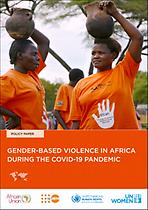Attachments [ 4 ]
More Details
Since the outbreak of the Corona Virus Disease (COVID-19), emerging data and reports from those on the front lines have shown that all types of violence against women and girls (VAWG) have intensified in countries affected by the pandemic. Before the pandemic, it was estimated that one in three women will experience violence during their lifetimes. Globally, 18% of ever-partnered women and girls aged 15–49 have experienced physical and/or sexual violence at the hands of a current or previous partner in the previous 12 months. Further, with COVID-19 there are reports of surges in violence against women (VAW) around the world being reported in many cases of upwards of 25% in countries with reporting systems in place. For every 3 months the lockdown continues, an additional 15 million additional cases of gender- based violence are expected. A study conducted in six Sahelian countries showed that domestic violence, whether physical or verbal, increased from 40.6% be-fore the COVID-19 crisis to 52.2% during the pandemic crisis, a rate of increase of 12%. Chad, Senegal and Mali recorded increases of 30%, 14% and 10% respectively. While Burkina Faso, Mauritania and Niger having less than 10% increase As stay-at-home orders expand to contain the spread of the virus, women with violent partners increasingly find themselves isolated from the people and resources that can help them. Globally, there have been reports of abuse such as intimate partner violence, sexual harassment, domestic and sexual abuse of women and girls in many cases by family members, which are exacerbated particularly under lockdowns, restricted movements and school closures. Correspondingly, the pandemic has far-reaching impact on harmful practices against women and girls, including the elimination of Child marriage and female genital mutilation. • Due to pandemic-related disruptions in prevention programmes, it is estimated that globally 2 million FGM cases could occur over the next decade that would otherwise have been averted.5 • Efforts to end child marriage can be dis-rupted by the COVID-19 Pandemic. Which could result in an additional total 13 million child marriages taking place that otherwise would not have occurred between 2020 and 2030. Moreover, it is reported that gender-based violence survivors have experienced limited access to legal protection services as most civil hearings and case-file reception at courts are suspended; issuances of court orders are significantly delayed; and most legal aid centers are closed including limited access to help lines for girls and women. Additionally, the pandemic and subsequent measures to address the pandemic have disrupted the availability and accessibility of services for survivors of violence. Service providers from all sectors, governmental and non-governmental, are over-stretched to maintain services to violence survivors, given constraints posed by the pandemic.7 For example, health services that are the first responders for women are overwhelmed, have shifted priorities, or are otherwise unable to help. Access to services could be further restricted for survivors with unclear immigration status, sex workers, and/or homeless and street- entrenched populations;9 as well as persons with disabilities, older persons, refugees, internally displaced persons and people living with HIV. This highlights that some categories of women and girls in Africa are among the most vulnerable groups exposed to the negative impacts of the coronavirus pandemic. Although, the COVID-19 pandemic is claiming the lives of many across the globe, the pandemic’s disproportionate impact on women and girls’ lives is threatening to reverse the hard-won gains in advancing women and girls’ rights and gender equality. This briefing report summarises published, grey literature and media reports on the rise of GBV as an aspect of the COVID-19 pandemic and lock downs in Africa. The brief documents the sharp increases in GBV outlining consequences, emerging priorities, promising practices and highlight their potential to effectively support and protect women and girls from gender based violence as a standard part of response to the COVID-19 pandemic in the Africa region. Understanding the dynamics between GBV and COVID-19 is important for crafting appropriate policy and programme responses.

Comments
(Leave your comments here about this item.)